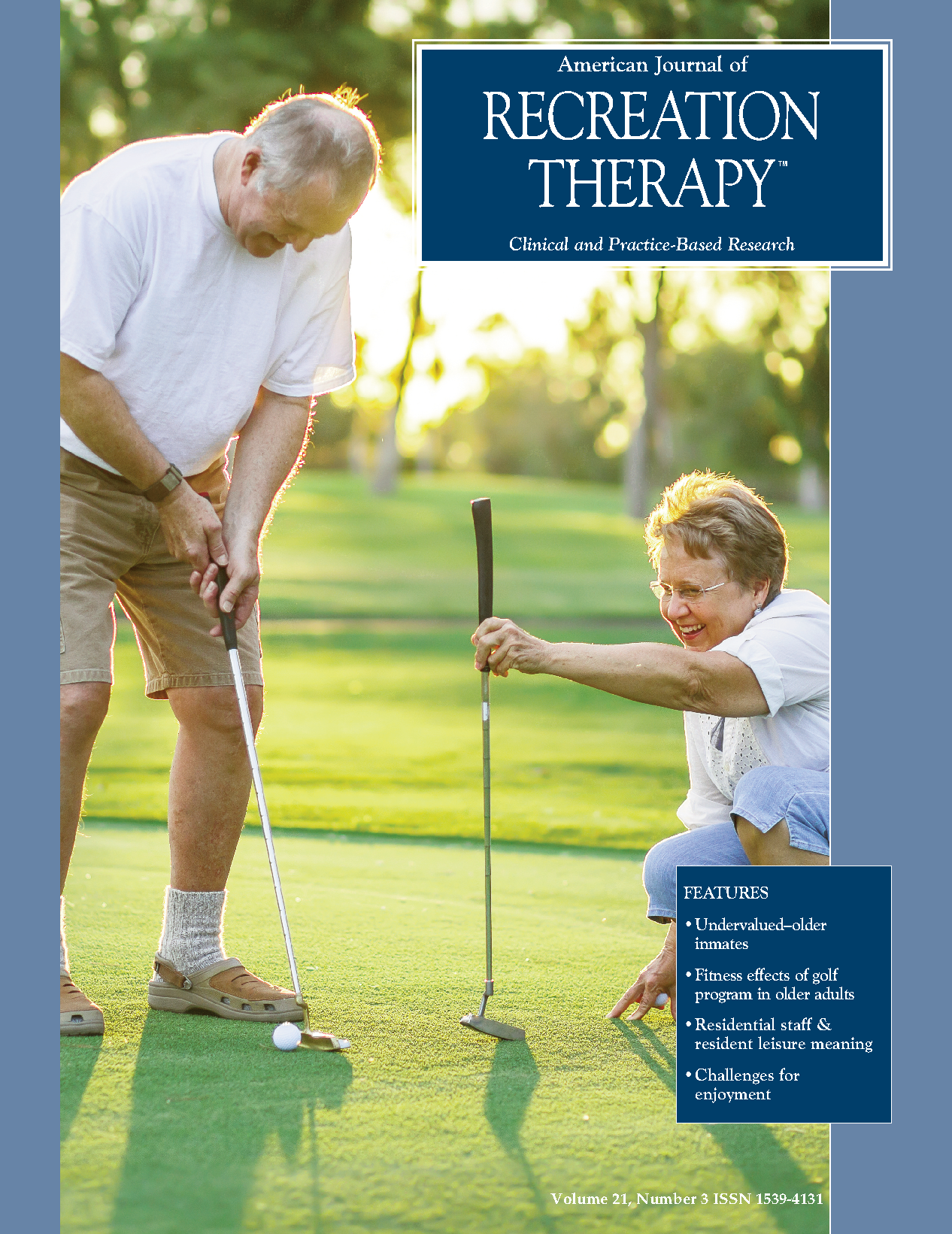Challenges to experience leisure enjoyment among individuals with serious mental illnesses
DOI:
https://doi.org/10.5055/ajrt.2022.0267Keywords:
leisure activities, pleasure, mental disorders, Flow theoryAbstract
This study aimed to explore common challenges to experiencing enjoyment during leisure activities among people with serious mental illnesses (SMI). Nineteen individuals receiving services at a community-based behavioral health service provider were interviewed. The analysis found three major challenges: (a) mismatch between activity difficulty and one’s skill/ability, (b) nonoptimal emotional states, and (c) distractions. The identified themes were aligned with the factors for optimal experience in the theory of Flow, which suggests that people with SMI face considerable challenges experiencing Flow. Recreational therapists should consider these potential relationships and plan programs that can bolster client potential for successful engagement in and enjoyment from leisure activities.
References
Hurd AR, Anderson DM: The Park and Recreation Professional’s Handbook. Champaign, IL: Human Kinetics, 2010.
Hutchinson SL, LeBlanc A, Booth R: More than “just having fun”: Reconsidering the role of enjoyment in therapeutic recreation practice. Ther Recreat J. 2016; 40(4): 220-240.
Henderson KA, Ainsworth BE: Enjoyment: A link to physical activity, leisure, and health. J Park Recreat Admi. 2002; 20(4): 130-146.
Haworth JT, Veal AJ (eds.): Work and Leisure. London: Routledge, 2004.
Wankel LM: The importance of enjoyment to adherence and psychological benefits from physical activity. Int J Sport Psychol. 1993; 24: 151-169.
Nagata S, Kono S: Depression and leisure-based meaning-making: Anhedonia as a mediating factor. Leis Stud. 2022; 41(2): 214-230.
Anderson LS, Heyne LA: Flourishing through leisure: An ecological extension of the leisure and well-being model in therapeutic recreation strengths-based practice. Ther Recreat J. 2012; 46(2): 129-152.
Dattilo J, Kleiber D, Williams R: Self-determination and enjoyment enhancement: A psychologically-based service delivery model for therapeutic recreation. Ther Recreat J. 1998; 32: 258-271.
Eversole M, Collins DM, Karmarkar A, et al.: Leisure activity enjoyment of children with autism spectrum disorders. J Autism Dev Disord. 2016; 46(1): 10-20.
Pelizza L, Ferrari A: Anhedonia in schizophrenia and major depression: State or trait? Ann Gen Psychiatry. 2009; 8(1): 22.
Lambert C, Da Silva S, Ceniti AK, et al.: Anhedonia in depression and schizophrenia: A transdiagnostic challenge. CNS Neurosci Ther. 2018; 24(7): 615-623.
Blanco JA, Barnett LA: The effects of depression on leisure: Varying relationships between enjoyment, sociability, participation, and desired outcomes in college students. Leis Sci. 2014; 36(5): 458-478.
Nagata S, McCormick BP, Piatt J: The impact of decreased capacity to experience pleasure on leisure coping strategies among individuals with major depressive disorder. Leis Sci. 2022; 44(1): 36-54.
Nimrod G, Kleiber DA, Berdychevsky L: Leisure in coping with depression. J Leis Res. 2012; 44(4): 419-449.
Nolen-Hoeksema S: The role of rumination in depressive disorders and mixed anxiety/depressive symptoms. J Abnorm Psychol. 2000; 109(3): 504-511.
Thomas N, Ribaux D, Phillips LJ: Rumination, depressive symptoms and awareness of illness in schizophrenia. Behav Cogn Psychother. 2014; 42(2): 143-155.
Falloon IR, Talbot RE: Persistent auditory hallucinations: Coping mechanisms and implications for management. Psychol Med. 1981; 11(2): 329-339.
Seidman I: Interviewing as Qualitative Research: A Guide for Researchers in Education and the Social Sciences. 2nd ed. New York: Teachers College Press, 1998.
Raeburn T, Halcomb E, Walter G, et al.: An overview of the clubhouse model of psychiatric rehabilitation. Australas Psychiatr. 2013; 21(4): 376-378.
Patton MQ: Qualitative Research and Evaluation Methods. 3rd ed. Thousand Oaks, CA: Sage, 2002.
Bengtsson M: How to plan and perform a qualitative study using content analysis. NursingPlus Open. 2016; 2: 8-14.
Banerjee M, Capozzoli M, McSweeney L, et al.: Beyond kappa: A review of interrater agreement measures. Can J Statistics. 1999; 27(1): 3-23.
Yin RK: Case Study Research Design and Methods. 3rd ed. Thousand Oaks, CA: Sage, 2003.
Fredrickson BL: Positive emotions broaden and build. Adv Exp Soc Psychol. 2013; 47: 1-53.
Elder RS, Mohr GS: Guilty displeasures: How imagined guilt dampens consumer enjoyment. Appetite. 2020; 150: 104641.
Mechanic D, McAlpine D, Rosenfield S, et al.: Effects of illness attribution and depression on the quality of life among persons with serious mental illness. Soc Sci Med. 1994; 39(2): 155-164.
Quoidbach J, Berry EV, Hansenne M, et al.: Positive emotion regulation and well-being: Comparing the impact of eight savoring and dampening strategies. Pers Individ Dif. 2010; 49(5): 368-373.
Lee Y, Dattilo J, Howard D: The complex and dynamic nature of leisure experience. J Leis Res. 1994; 26(3): 195-211.
Csikszentmihalyi M: Finding Flow: The Psychology of Engagement with Everyday Life. New York, NY: Basic Books, 1997.
Published
How to Cite
Issue
Section
License
Copyright 2000-2023, Weston Medical Publishing, LLC
All Rights Reserved


